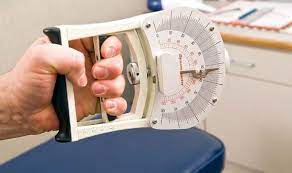TBB BUREAU
NEW DELHI, MAY 2, 2023
Lower grip strength and slower timed-up-and-go (TUG) i.e. time taken to rise from a chair, walk three meters and sit back down can be the warning signals of dementia in-waiting, researchers have said.

Dementia is the loss of cognitive functioning — thinking, remembering, and reasoning — to such an extent that it interferes with a person’s daily life and activities. Some people with dementia cannot control their emotions, and their personalities may change
To investigate the relationship between muscle function and dementia, the research teams from Edith Cowan University’s (ECU) Nutrition & Health Innovation Research Institute and Centre for Precision Health used data from the Perth Longitudinal Study of Ageing in Women to examine more than 1000 women with an average age of 75.
In collaboration with the University of Western Australia, the team measured the women’s grip strength and the timed-up-and-go (TUG) test. These tests were repeated after five years to monitor any loss of performance.
Over the next 15 years, almost 17 per cent of women involved in the study were found to have had a dementia event, categorised as a dementia-related hospitalisation or death.
The women with the weakest grip strength were found to be more than twice as likely to have a late-life dementia event as the strongest individuals.
A similar relationship emerged between TUG performance and dementia, with the slowest in their TUG test more than twice as likely to experience dementia as the quickest.
When researchers looked at the changes in grip strength and TUG test results after five years, a decrease in performance was also linked with greater dementia risk.
Those who had experienced the biggest decline in grip strength and TUG speed were approximately 2 and 2.5 times more likely, respectively, to have had a dementia event, compared to those in the group who recorded the smallest decline in performance.
Women with the biggest drop in TUG performance were found to be over four times more likely to have a dementia-related death than the fastest.
Senior researcher Dr Marc Sim said grip strength, which can be easily measured using a handheld device known as a dynamometer, may be a measure of brain health due to the overlapping nature of cognitive and motor decline.
“Possibly due to a range of underlying similarities, grip strength may also present as a surrogate measure of cardiovascular disease, inflammation and frailty, which are known risk factors for dementia,” Dr Sim said.
He said that the findings from the study could help health professionals to identify dementia risk in patients earlier.
“Both grip strength and TUG tests aren’t commonly performed in clinical practice, but both are inexpensive and simple screening tools,” he said.
“Incorporating muscle function tests as part of dementia screening could be useful to identify high-risk individuals, who might then benefit from primary prevention programs aimed at preventing the onset of the condition such as a healthy diet and a physically active lifestyle.
“The exciting findings were that decline in these measures was associated with substantially higher risk, suggesting that if we can halt this decline, we may be able to prevent late-life dementias. However, further research is needed in this area.”
The study was published in the Journal of Cachexia, Sarcopenia and Muscle.
 The Business Bytes
The Business Bytes
